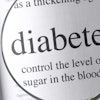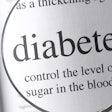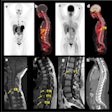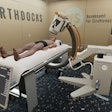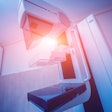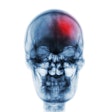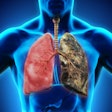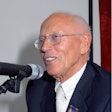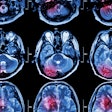
It's no surprise that residents and radiologists don't like breaking bad news to patients with serious medical conditions. But a survey from Pakistan suggests some types of medical specialists are more willing to tell patients the awful truth, while others pass the job along to the referring physician.
The findings are based on a survey that was a joint effort by radiology residents, who composed half of the respondents, followed by radiologists from private practice (28%) and academia (13%), with other trainees representing about 8%. The results were published in the Journal of the College of Physicians and Surgeons Pakistan (October 2013, Vol. 23, pp. 761-763).
Academic radiologists communicated with their patients more often than any other physician category. Still, when dealing with severe abnormalities such as malignancy, half of residents, 55% of the academic radiologists, and 74% of private practicing radiologists were "very uncomfortable" disclosing results.
Overall, less than half of respondents had not received any kind of training in imparting bad news, including 56% of residents and 71% of practicing radiologists. But according to the authors, respondents from teaching hospitals were more likely than radiologists in private practice to have received training in communication and interpersonal skills, 51% versus 38%, although the difference was not statistically significant (p = 0.058).
 Some radiologists are more willing to break bad news than others, according to Ranish Deedar Ali Khawaja.
Some radiologists are more willing to break bad news than others, according to Ranish Deedar Ali Khawaja.Generally speaking, residents were more willing than radiologists to take on the job of giving bad news, and there were also gender differences in willingness to take on the task, wrote study author Ranish Deedar Ali Khawaja and colleagues from Aga Khan University in Karachi. Overall, residents and radiologists in Pakistan see their roles as interpreters of information only, Khawaja wrote in an email to AuntMinnie.com.
"They have been reporting normal as well as abnormal results to the referring physicians rather than just disclosing by themselves," he said. "However, in case of academic radiologists, who were in the minority in our survey, we found that this cohort was the only one that was better trained at disclosing bad news to their patients and were more likely to do that on a regular basis."
There is a nearly universal need for more training in this difficult task, wrote Khawaja, who is currently a radiology research fellow at Massachusetts General Hospital in Boston and Harvard Medical School in Cambridge, MA.
The study aimed to record the practices of breaking bad news to the patients by Pakistani radiologists and trainees. Data were gathered in a cross-sectional survey of trainees and radiologists attending the 2010 National Conference of Radiology in Pakistan.
Responses were received from 228 participants (76% response rate) with a mean age of 36 ± 8 years (range 24-69; 51% women). Most respondents were from Karachi (66%) followed by Lahore (15%), Islamabad (4%), Peshawar (4%), and other regions.
A wide variety of responses were received from radiologists in private practice, and from radiology trainees. Among trainees, 27% of respondents denied having any communication with patients whatsoever.
One-fourth of all survey respondents communicated with their patients "most of the time" followed by 22% who said they communicated with every patient. And when asked how often they had to deliver bad news during patient encounters, most responded they did so either occasionally (31%) or never (30%), the study team wrote.
First-year residents were more likely to communicate with every patient than senior residents, and they were more likely to deliver bad news than senior residents, he wrote. Finally, fourth-year residents were less likely to be interested in obtaining further training in breaking bad news than junior residents.
"We believe that as a trainee enters the residency program he is more interested in communicating with patients," Khawaja wrote. "But with increasing experience during residency, they become more cautious and take the role of an interpreter by reporting results to only the referring physicians."
Khawaja also noted gender differences in the results.
"Female radiologists and trainees were more likely to communicate 'most of the time' with their patients," he wrote. "In contrast, male participants were more likely to report 'never' when asked about their frequency of communication."
Finally, academic radiologists were more likely to be willing to discuss negative results compared with private-practice radiologists, a trend that was likely related to their greater training levels in doctor-patient communication.
"In the case of academic radiologists, who were in the minority in our survey, we found that this cohort was the only one that was better trained at disclosing bad news to their patients and was more likely to do that on a regular basis," Khawaja told AuntMinnie.com.
Perilous environment
The reasons for wanting to avoid breaking bad news aren't difficult to spot, the authors noted. Even though most patients want full and immediate disclosure of information, the physician holds the "massive responsibility" of evaluating the requirements of the patient, including some who prefer limited information.
Many studies advise a personal approach to each patient and enormous vigilance regarding the disclosure of negative information.
"On the other hand, radiological findings can be nonspecific, and breaking bad news merely considering the imaging appearance can be ironic and counterproductive," Khawaja and colleagues wrote. "Additionally, radiologists usually do not know much about the patient's history, treatment options, and psychosocial implications of a specific disease so the information at times may be inaccurate, especially if imparted by a junior colleague."
Faced with unexpected or alarming findings, radiologists can always contact referring physicians to find out how they handle the situation, and it's helpful if the two parties know each other.
Interestingly, private-practice radiologists were less interested in obtaining further training in delivering bad news compared with their academic counterparts, Khawaja wrote. And for the most part, residents were very interested in learning communication and interpersonal skills required for breaking bad news during their residency.
More than two-thirds of private practice radiologists said they had received no training in delivering bad news, while academic radiologists were more likely to have received training during their practice in a teaching hospital.
"We believe radiologists in Pakistan who are practicing in an academic setting are more likely to be held liable for this issue due to strict hospital policies," Khawaja wrote. "And also, they attend regular training sessions and workshops on improving their communication skills in most teaching hospitals."
In the West, 90% of radiologists consider themselves eligible to impart any findings that arise directly to the patient, Khawaja wrote, adding, "But, as evidenced by our study, radiologists increasingly seem to reject the burden of disclosure as the news bends toward anomaly."
Variations in the willingness to disclose negative information are related to different training levels and different practice settings in Pakistan.
"Our survey suggested that there is a dire need to incorporate training programs on communication and interpersonal skills in the undergraduate medical curriculum," Khawaja told AuntMinnie.com. "Not only the undergraduates, but also the residents, fellows, and even senior radiologists should be involved extensively so that the foundation is laid to nurture the skills from the very beginning."
Defining bad news as "any news that drastically and negatively alters the patient's view of his or her future," the authors said that lacking adequate communications training, medical professionals have found it hard to deal with the need to deliver bad news in daily clinical practice. In any case, the emphasis in developing communication skills is much further along in the Western Hemisphere than in Pakistan, and that problem needs to be addressed, wrote Khawaja and colleagues.
